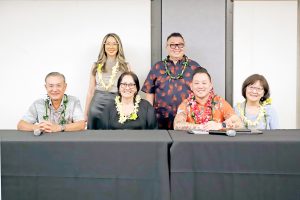Captions:
The Okaeri book team and contributors
photo: alan kubota, lenscape photography
Marsha Aizumi discusses living in hope with Aiden.
The “Letters to Home” anthology, published by Okaeri
Carrie Morita (center) with her kindergarten student on the left that she invited to the Okaeri book launch
photo: courtesy of carrie morita
Participants at the Hawaii LGBTQ+ event are (seated, front row from left) Bill Kaneko, Justice Sabrina Shizue McKenna, Aiden Aizumi, Marsha Aizumi and (standing, from left) moderators Haylin Dennison and Cam Miyamoto.
Marsha and Aiden Aizumi with Debbie Kubota and Jon Masuoka from Honpa Hongwanji Hawai’i Betsuin

Marsha Aizumi
I love this theme of “History and Hanashi” (stories) that the P.C. has selected for this holiday issue. There is beauty and connection to our history and our stories. They define where we have been, where we are now and where we will go. This connection was very evident to me while Aiden and I were speaking at an event in Honolulu this year. The event was about LGBTQ+ equity and inclusion in Hawaii’s Japanese Community. Initially organized by the Honpa Hongwanji Hawai’i Betsuin, at least six other organizations, including JACL Honolulu, also participated.
At the event, Bill Kaneko, former JACL Honolulu president, talked about how he led JACL National to become the first non-LGBT civil rights organization to support marriage equality. Also speaking on the panel was Justice Sabrina Shizue McKenna, the first openly LGBTQ+ Asian American to serve on a state supreme court. Justice McKenna came out as a lesbian to show that anything is possible. Bill and Justice McKenna talked about the history of LGBTQ+ inclusion in Hawaii, both past and present.

Participants at the Hawaii LGBTQ+ event are (seated, front row from left) Bill Kaneko, Justice Sabrina Shizue McKenna, Aiden Aizumi, Marsha Aizumi and (standing, from left) moderators Haylin Dennison and Cam Miyamoto.
Aiden and I were asked to share our story and represent the future hope for our Japanese community. As I looked out into the audience, I saw people who were there with their same-gender partner, parents and children who looked on with anticipation as to how Aiden and I were able to navigate this challenging journey.
After the event, one of the things that touched me the most was a person who shared that while I spoke, they focused on Aiden’s face. What his face revealed was pure love. Just 10 days before the election, I felt we were all were united in seeing a world that would support love in its broadest sense. Of course, we know that the outcome of this election made this hope fragile, but that is a story for another issue.
A week after the Hawaii event, Aiden and I were at an event for Okaeri’s recently published book, “Letters to Home: Art and Writing by LGBTQ+ Nikkei and Allies.” Both of us contributed to this anthology. I wrote the history of Okaeri, and Aiden submitted a poem, “What is Pride?” Again, here was the theme of history and storytelling woven together. I loved all the pieces of this book, but a few stood out to me personally.
Nikiko Masumoto’s piece called “A Long Welcome” spoke to my heart when I read these words:
You who are raising our children to love themselves
You who are seeking healing and relief
Ellen Tanouye’s piece called “Feet” made me smile when I read:
I would like to focus on feet. Just plain feet. Since I am short my feet are puny. But they are what gets me to the places I need to go . . .
She ends by saying:
We realize that sometimes our feet just need to be patient and step forward when the timing is right. . . One step at a time. And if our feet could tell the story, they would certainly say that no matter what, love is beyond all understanding and reason. Love is love. Our feet just know that.
Finally, Aiden’s piece that I referred to in a previous article called “What Is Pride?” made me feel proud of him.
I have highlighted these two events because they certainly fit the theme of “History and Hanashi,” and they represent the hope I have in these uncertain times for our LGBTQ+ community and nation. I am looking for small moments of hopefulness to help me move forward because I already see areas that are threatening our community.
But I can’t lay down in despair because those who came before me persevered so that Aiden could have the life and rights he has today. To give up would not be honoring the work and courage that Bill Kaneko and Justice McKenna spoke about in Hawaii. To give up would not be honoring all the contributors to the Okaeri book who openly shared their experiences and hopes for the future.
Being silent does not change the world. It is our voices, our experiences, our stories that can reach into the hearts of others and bring out the humanity that lives in us all. It is our history that can show us the way. And it is the support of one another that can give us strength and determination when times look the darkest. Please visit www.okaeri.org/connects if you need a community to support you or if you want to provide support to others.
As we celebrate the holiday season, it is my wish that we use our history and the stories that we have heard or possess to bring more acceptance and love into our moments together. And if you need a beautiful gift for someone in your family for Christmas, perhaps you will consider buying Okaeri’s book on Amazon under “Letters to Home Okaeri,” which is also at the Japanese American National Museum bookstore in Los Angeles’ Little Tokyo.
What we do today will be the history for future generations. I am hopeful that when they look back on these days, our grandchildren and others will say that we were courageous, acted with love and came together to support those in our Nikkei community who needed us the most . . . .
Marsha Aizumi is an advocate for the LGBTQ+ community and author of the book “Two Spirits, One Heart: A Mother, Her Transgender Son and Their Journey to Love and Acceptance.” Click here to read past columns.



